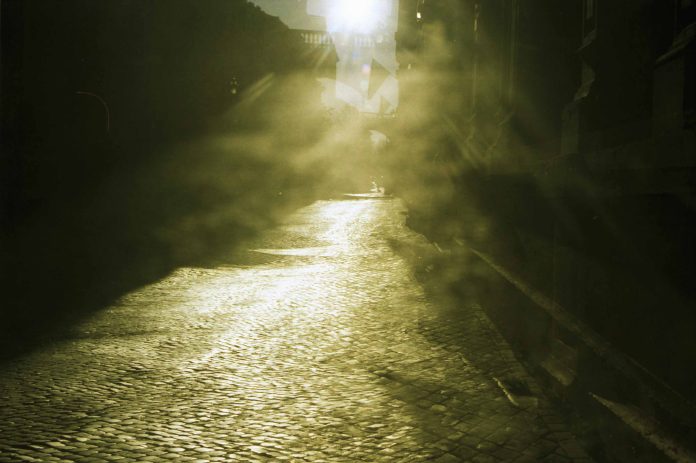“Redden, or Renton, or something. Northern.”
I know what these guys are talking about. I practically yelped out the answer: “Redding, California!”
“That’s it!”
“The halfway point between here and LA,” I explained. “It’s where I sleep when I’m driving down.”
“Cool,” said the younger fellow. “I did LA to Everett once in seventeen hours.” What an odd couple they made. Friends, as far as I could tell, one quieter and Slavic-looking, with a blonde beard that could put him anywhere between twenty and forty; the other a young college student with a dark mop and plastic-frame glasses.
“Seventeen hours,” I exclaimed. “That’s amazing!”
“Yeah, well, that was like with no stopping. Didn’t get out of the car at all except gas and coffee.”
“Wow. The fastest I’ve done is twenty, and I thought that was pushing it!”
“Do you go there, or are you from there?”
“From there yeah,”
“Me too! What part?” Angelinos always have to ask that. It’s what we do.
“Downey!”
“What?!” First of all, that he had even heard of the neighborhood; but that he was from there too??
“And you?”
“Oh my goodness, Firestone Boulevard!”
“No way!”
We blew up in a cascade of benevolent fireworks, animatedly exchanging notes on freeways and roads and buffets and schools. Effervescent vitality was in the air, and it made sense to blurt with nigh-nonsensical enthusiasm to his companion: “And how about you, my friend? Where are you visiting from?”
The Slavic beard looked up in mild confusion. “Me?”
“Yes!”
“Russia!”
“Excellent! Okay, I have a question. Why is there so much great literature that comes from Russia? How do they do it?”
His friend chimed in. “Maybe ’cause it’s so cold? All that crappy weather?”
The man had a delightful mixture of seriousness and conviviality. Personally, I think the seriousness was really just his beard. “Yeah, you know,” he expounded further, “the weather in Russia is so cold that you really only have two options: get drunk, or write great literature!”
Guffaws all around. “Yeah, Anna Karenina is one of my favorite books of all time.”
“Really?”
“Yeah, so much of human life is contained in those pages. And it’s so relevant to us too, even though it’s written a hundred fifty years ago, you know?”
A young lady seated opposite chimed in, saying to me, “you should read Karamazov Brothers next!”
“Yes, I want to! Dostoyevsky!”
The Slavic Beard marveled. “You guys have read more of them than me!”
The young lady had a spirited glow. She said to me, “what have you been reading lately?”
I mention Richard Wright and Henry Fielding. The others join in, and I steer the conversation away from myself. It’s always more interesting to listen.
“What about you, what are you guys reading?” I especially want to hear the Russian man’s thoughts.
He says, “I really like, how do you call it, Nineteen–”
“1984! George Orwell!”
“Yes! That’s funny, we’ve been reading each other’s books!”
“Yeah, we’re always reaching for what’s far away,”
“The foreign stuff is always more interesting.”
“Tolstoy is my favorite,” I say wistfully. I grew up on the guy. “Everything I’ve read by him is so good.”
The young lady: “I always worry if I’m losing something in the translation though. I started reading Anna Karenina in Russian and I noticed there was so much I wasn’t getting in the English…”
It was her pronunciation of Karenina.
The Russian man knew, then, that she was a native Russian speaker too, and they were off to the races. They were building together in their conversation, rising higher and higher, two hawks soaring on thermals, a symphony orchestra reaching upward, picking up speed; two people living on opposite ends of the earth finding the familiar. “All encounters are a kind of reunion,” reads a line in Buddhist scripture, and together they made the old new again. This strange bus in its strange city was no longer so odd for our Russian friend. I had just found a former neighbor, we’d all just discovered we’ve been reading each other’s books, and he’d just found a friend, his own accent on the other side of the world.
What serendipity, what meaning behind these beautiful happenstance intersections? One day we will know the answers. There was nothing for the college student and I to do but sit back and marvel. We had built it in concert, the four of us, turned a nighttime city bus ride into something safe, kind, familiar. Our own sort of fireplace.
Nathan Vass is an artist, filmmaker, photographer, and author by day, and a Metro bus driver by night, where his community-building work has been showcased on TED, NPR, The Seattle Times, KING 5 and landed him a spot on Seattle Magazine’s 2018 list of the 35 Most Influential People in Seattle. He has shown in over forty photography shows is also the director of nine films, six of which have shown at festivals, and one of which premiered at Henry Art Gallery. His book, The Lines That Make Us, is a Seattle bestseller and 2019 WA State Book Awards finalist.



